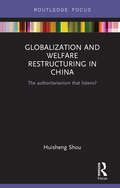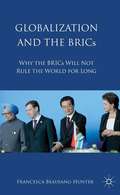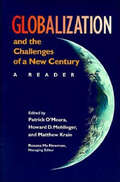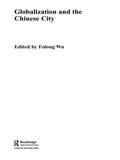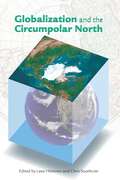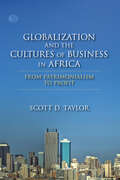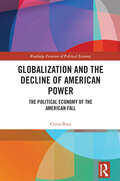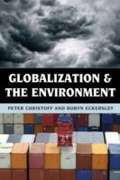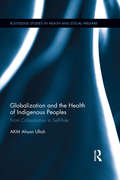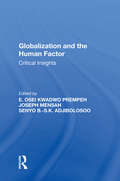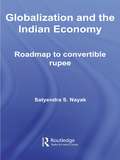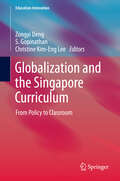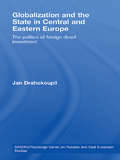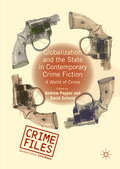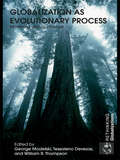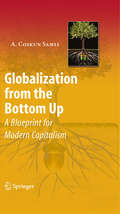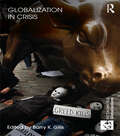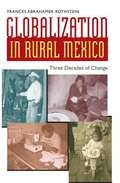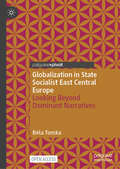- Table View
- List View
Globalization and Welfare Restructuring in China: The Authoritarianism That Listens? (Routledge Contemporary China Series)
by Huisheng ShouIn the past few decades, the change in China’s welfare system has been characterised by a balanced distribution of benefits across social sectors and the institutionalization of welfare redistribution. This process has occurred without significant political change that would empower politically disadvantaged groups such as the urban and rural poor. This book questions what has motivated the regime to redistribute welfare benefits through an institutionalized manner whilst its political structure remains largely unchanged. By situating China within the broader context of East Asia and against the backdrop of globalization since the 1980s, this book examines the institutional origin and development of China’s new welfare system. Through doing this, it provides an understanding of the nature of the Chinese state in dealing with its economy and society in a context of global economic integration. A global-local dynamics framework highlights the importance of the interactive relationship between China’s integration into the world economy and its unique geopolitical constraints, which together induce the regime to listen to its subjects and follow a "move to the middle" in welfare restructuring. Offering a novel explanation of the welfare-globalization relations in a non-democratic setting, this book will be of interest to students and scholars of Social Policy, International Political Economy and Chinese Politics.
Globalization and the BRICs: Extending The Cognitive Science Of Religion (Palgrave Frontiers In Philosophy Of Religion Ser.)
by Francesca BeausangAs the Eurozone faces an uncertain future and Obama struggles to demonstrate that America still has a superpower status, this book challenges the widespread perception that Brazil, Russia, India and China are becoming global economic and political powers, instead forecasting a decline rooted in excessive inequality and insufficient innovation.
Globalization and the Challenge of a New Century
by Patrick O'Meara Howard Mehlinger Matthew KrainThis book focuses on globalization while at the same time reaffirming the importance of the area concept
Globalization and the Challenges of a New Century: A Reader
by Patrick O’Meara, Howard D. Mehlinger and Matthew Krain"If you want to catch up on some of the best articles written about globalisation since the topic became fashionable several years ago, this reader is the place to start." —The Economist A blue ribbon collection of major articles and position papers on the concept of globalization. By bringing together a number of major thinkers and different perspectives, this book provides a broad introduction to the topic and lays the groundwork for an interdisciplinary collaborative dialogue. Contributors include Kofi Annan, Benjamin Barber, Francis Fukuyama, Samuel Huntington, Robert Kaplan, Paul Kennedy, Walter Lacqueur, Bill McKibben, Lester Thurow, and Jeffrey Sachs.
Globalization and the Chinese City (Routledge Contemporary China Series #Vol. 7)
by Fulong WuIntroducing readers to the far-reaching global orientation that is now taking place in urban China, an international team of contributors describe overarching globalization through a detailed examination of the transformation of the built environment. A range of urban development processes are analyzed including urbanization, real estate development, changing landscapes, the industrial restructuring of the second-tier city, and the formation of the city-region in the context of global and local interactions. In examining city development and local practices as part of globalization processes, the global city is treated as a collection of microcosms and concrete places, overcoming the analytical tension of the dichotomy of the perceived 'East versus West' divide.
Globalization and the Circumpolar North
by Heininen, Lassi; Southcott, ChrisThe circumpolar north has long been the subject of conflicting national aspirations and border disputes, and with the end of the cold war and the coming era of potential resource scarcity, its importance will only grow over the next several decades. Anticipating that renewed prominence, Globalization and the Circumpolar North brings together an array of scholars to explore the effects of this increased attention, from the new opportunities offered by globalization to the potential damage to long-isolated northern communities and peoples.
Globalization and the Cultures of Business in Africa: From Patrimonialism to Profit
by Scott D. TaylorCan Africa develop businesses beyond the extractive or agricultural sectors? What would it take for Africa to play a major role in global business? By focusing on recent changes, Scott D. Taylor demonstrates how Africa's business culture is marked by an unprecedented receptivity to private enterprise. Challenging persistent stereotypes about crony capitalism and the lack of development, Taylor reveals a long and dynamic history of business in Africa. He shows how a hospitable climate for business has been spurred by institutional change, globalization, and political and economic reform. Taylor encourages a broader understanding of the mosaic of African business and the diversity of influences and cultures that shape it.
Globalization and the Decline of American Power: The Political Economy of the American Fall (Routledge Frontiers of Political Economy)
by Cyrus BinaThis book explores America’s decline as a global power, arguing that the implosion of Pax Americana was initiated by the process of globalization, preceding the collapse of the Soviet Union by nearly a decade. The era of Pax Americana, and with it American hegemony, is conclusively passed, and will not return in current global conditions. There is a stark contrast between the present epoch and the postwar era of American hegemony (1945–1979) in which the United States, at least outside of the Soviet sphere of influence, largely managed the international economy and reigned over international politics and relations. Drawing on both theoretical and empirical evidence, this book shows that the era of globalization unleashed forces—social, political, and economic—which broke down the status quo of American hegemony. Author Cyrus Bina also establishes that since the Iranian Revolution (1979), US involvement throughout the Middle East, in Iraq, Afghanistan, Libya, Syria, Yemen, and now notably in Ukraine has been motivated by the freefall of American hegemony and an attempt to get it back by direct or indirect military force. Bina utilizes these contexts for wider analysis and critique of a number of theories commonly used to analyze economy, polity, geopolitical, and dynamics of crisis and social change in capitalism. This book will be of great interest to students, academics, and policymakers on subjects of Economics, International Relations, Global Studies, International Political Economy, Political Geography, Sociology, and postwar History.
Globalization and the Distribution of Wealth
by Arie M. KacowiczThe effects of globalization on poverty and inequality are a key issue in contemporary international politics, yet they have been neglected in international relations and comparative politics literatures. Arie M. Kacowicz explores the complex relationships between globalization and the distribution of wealth as a political problem in international relations, analyzing them through the prism of poverty and inequality. He develops a political framework (an 'intermestic model') which captures the interaction between the international and the domestic domains and explains those effects with a particular emphasis upon the state and its relations with society. He also specifies the different hypotheses about the possible links between globalization and the distribution of wealth and tests them in the context of Latin America during the years 1982–2008, with a particular focus on Argentina and the deep crisis it experienced in 2001–2.
Globalization and the Economic Consequences of Terrorism (New Security Challenges)
by Brenda J. Lutz James M. LutzThis book analyzes the effects of economic, social, and political disruptions that have come with integration into the global economy for countries in five different regions and the developing world as a whole. One consequence of such disruptions is increased levels of terrorism in many countries. In addition, the effects of terrorism on economic activities were measured. Although the patterns vary for the regions, there is no doubt that connections exist. Political links with outside countries have mitigated some of the negative consequences of entering into greater contact with other countries. There is less evidence that the increased terrorism from these disruptions has had negative effects on foreign investment and tourism. This volume will provide essential materials for researchers and students interested in the connections between globalization and terrorism and between terrorism and accompanying negative economic consequences.
Globalization and the Environment
by Robyn Eckersley Peter ChristoffThis book by two leading scholars offers the first systematic analysis of the relationship between globalization and the environment from the early Modern period to the present. Peter Christoff and Robyn Eckersley develop a broad conceptual framework for understanding the globalization of environmental problems and the highly uneven, often faltering, international political response. The authors develop linkages between economic globalization and environmental degradation and explore a range of key global environmental problems focusing on the two most challenging of all: climate change and biodiversity loss. Finally, they critically explore the challenges of environmental governance in a world defined by global capitalism and sovereign states. Providing a normative framework for evaluating global environmental governance, they suggest alternative institutional and policy responses. Through a rich set of case studies, this powerful book will help readers grasp the systemic causes of global environmental degradation as well as the myriad opportunities for reform of global environmental governance. "
Globalization and the Gulf
by John W. Fox Nada Mourtada-Sabbah Mohammed Al-MutawaFor centuries, the Arabian Gulf has been a crossroads where seafaring people and Bedouins alike travelled great distances transacting business. Events of the past few years, both good and bad, have directed the world’s attention to the Arabian Peninsula, where a rich cultural tradition is rapidly incorporating the latest innovations from around the world. This is the process of globalization. New economies create enormous potential, but it will require great care for the people of the region to steer through a period of profound change. Political and economic interests intent on maintaining the flow of petroleum products on one hand, and people in the Gulf region who assess their won interests from quite a different perspective, on the other, exert pressures from conflicting directions. Reconciling these interests in a time of rapid globalization poses enormous challenges. This timely volume brings together the work of scholars from both the Middle East and the West who have the expertise to evaluate the interaction of new ideas, new technologies and new economies. Brought together by the American University of Sharjah and the Sociological Association of the UAE, the contributors reflect on both the process of globalism and on the traditions of Gulf society and culture, offering views on how these trends interact within the global system.
Globalization and the Health of Indigenous Peoples: From Colonization to Self-Rule (Routledge Studies in Health and Social Welfare)
by Ahsan UllahIn 70 countries worldwide, there is an estimated 370 million indigenous peoples, and their rich diversity of cultures, religions, traditions, languages and histories has been significant source of our scholarships. However, the health status of this population group is far below than that of non-indigenous populations by all standards. Could the persisting reluctance to understand the influence of self-governance, globalization and social determinants of health in the lives of these people be deemed as a contributor to the poor health of indigenous peoples? Within this volume, Ullah explores the gap in health status between indigenous and non-indigenous peoples by providing a comparative assessment of socio-economic and health indicators for indigenous peoples, government policies, and the ways in which indigenous peoples have been resisting and adapting to state policies. A timely book for a growing field of study, Globalization and the Health of Indigenous Peoples is a must read for academics, policy-makers, and practitioners who are interested in indigenous studies and in understanding the role that globalization plays for the improvement of indigenous peoples’ health across the world.
Globalization and the Human Factor: Critical Insights
by Joseph MensahSince the 1980s, the world has experienced an unprecedented push towards economic, political, social, cultural, financial and technological integration. This integration is a key element of the process of globalization. Much of this revolves around the tensions and conflicts inherent in globalization with emphasis on political economy but at the expense of the human factor (HF), which places people at the centre of all discussions about globalization. This volume brings the HF into the debate and examines to what extent this hitherto marginalized concept holds the key to providing a holistic understanding and contestation of globalization. The volume develops a distinct concept or framework of the human factor; examines the role and significance in global change from an interdisciplinary perspective; analyzes the extent and significance in contemporary globalization discourse; and provokes further debate about the unresolved disputes surrounding globalization. The account will help readers navigate the 'minefields' of the globalization debate.
Globalization and the Indian Economy: Roadmap to a Convertible Rupee (Routledge Studies in the Growth Economies of Asia #Vol. 80)
by Satyendra S. NayakThis book examines the impact of globalization on the Indian economy, exploring the trade, investment and financial aspects of globalization, and also considering its implications for the balance of payments and currency exchange rate. The first part of the book deals with the evolution of the philosophy of globalization and its impact on exchange rates, global liquidity, currency markets, and global trade and payments. It highlights the catalytic role played by the US in driving the globalization process, and provides detailed analysis of the evolution of the international monetary system to illustrate current processes of globalization. Furthermore, a critical discussion of the Asian financial crisis of 1997 is presented as well as the lessons that have emerged from the crisis. The Indian economic experience and its own policy of dealing with globalization is the focus of second part of the book. The author examines the genesis of economic reforms and liberalization in India. The success of the Indian policy of gradualism is discussed in the context of the Asian crisis, and the reasons as to why India averted a similar crisis are explored. Finally, the author examines whether the Indian currency, the rupee, can be made fully convertible. This book makes a valuable contribution to the literature on globalization and development and should be of interest to academics interested in the global economy, international finance, international development and also to academics with an interest in South Asian Studies.
Globalization and the Politics of Development in the Middle East
by Clement Moore Henry Robert SpringborgIn a new edition of their book on the economic development of the Middle East and North Africa, Clement Henry and Robert Springborg reflect on what has happened to the region's economy since 2001. How have the various countries in the Middle East responded to the challenges of globalization and to the rise of political Islam, and what changes, for better or for worse, have occurred? Utilizing the country categories they applied in the previous book and further elaborating the significance of the structural power of capital and Islamic finance, they demonstrate how over the past decade the monarchies (as exemplified by Jordan, Morocco, and those of the Gulf Cooperation Council) and the conditional democracies (Israel, Turkey, and Lebanon) continue to do better than the military dictatorships or "bullies" (Egypt, Tunisia, and now Iran) and "the bunker states" (Algeria, Iraq, Libya, Sudan, Syria, and Yemen).
Globalization and the Post-Creole Imagination: Notes On Fleeing the Plantation
by Michaeline A. Crichlow Patricia NorthoverGlobalization and the Post-Creole Imagination is a major intervention into discussions of Caribbean practices gathered under the rubric of "creolization. " Examining sociocultural, political, and economic transformations in the Caribbean, Michaeline A. Crichlow argues that creolization--culture-creating processes usually associated with plantation societies and with subordinate populations remaking the cultural forms of dominant groups--must be liberated from and expanded beyond plantations, and even beyond the black Atlantic, to include productions of "culture" wherever vulnerable populations live in situations of modern power inequalities, from regimes of colonialism to those of neoliberalism. Crichlow theorizes a concept of creolization that speaks to how individuals from historically marginalized groups refashion self, time, and place in multiple ways, from creating art to traveling in search of homes. Grounding her theory in the material realities of Caribbean peoples in the plantation era and the present, Crichlow contends that creolization and Creole subjectivity are constantly in flux, morphing in response to the changing conditions of modernity and creatively expressing a politics of place. Engaging with the thought of Michel Foucault, Michel Rolph-Trouillot, Achille Mbembe, Henri Lefebvre, Margaret Archer, Saskia Sassen, Pierre Bourdieu, and others, Crichlow argues for understanding creolization as a continual creative remaking of past and present moments to shape the future. She draws on sociology, philosophy, postcolonial studies, and cultural studies to illustrate how national histories are lived personally and how transnational experiences reshape individual lives and collective spaces. Critically extending Bourdieu's idea of habitus, she describes how contemporary Caribbean subjects remake themselves in and beyond the Caribbean region, challenging, appropriating, and subverting older, localized forms of creolization. In this book, Crichlow offers a nuanced understanding of how Creole citizens of the Caribbean have negotiated modern economies of power.
Globalization and the Singapore Curriculum
by Zongyi Deng S Gopinathan Christine Kim-Eng LeeThis volume provides a multi-faceted and critical analysis of the Singapore curriculum in relation to globalization. First, it details reform initiatives established by the Singapore government to meet the challenges posed by globalization. Next, Globalization and the Singapore Curriculum presents how these reforms have been translated into programs, school subjects and operational frameworks and then examines, in turn, how well these have been implemented in schools and classrooms across the country. Through this examination, the book reveals how the initiatives, together with their curricular translation and classroom enactment, reflect on the one hand global features and tendencies and, on the other, distinct national traditions, concerns and practices. It brings to light a set of issues, problems and challenges that not only concern policymakers, educators and reformers in Singapore but also those in other countries as well. Written by curriculum scholars, policy analysts, researchers and teacher educators, Globalization and the Singapore Curriculum offers an up-to-date reference for postgraduate students, scholars and researchers in the areas of curriculum and instruction, comparative education, educational sociology, educational policy and leadership in Singapore, the Asia Pacific region and beyond. It also offers a vital contribution to the story of modern education around the globe: providing international students, scholars and researchers valuable insights into curriculum and curriculum reform for the 21st century.
Globalization and the State in Central and Eastern Europe: The Politics of Foreign Direct Investment (BASEES/Routledge Series on Russian and East European Studies)
by Jan DrahokoupilThis book examines the transformation of the state in Central and Eastern Europe since the end of communism and adoption of market oriented reform in the early 1990s, exploring the impact of globalization and economic liberalization on the region’s states, societies and political economy. It compares the different policies and national strategies adopted by key Central and Eastern European states, including the Czech Republic, Poland, Hungary and Slovakia, showing how initial internally oriented strategies of market reform, privileging domestic sources of investment, had by the late 1990s given way to externally oriented strategies emphasising the promotion of competitiveness by attracting foreign investment. It explores the reasons behind this convergence, considering the influence of internal and external forces, and the roles of interests, institutions and ideas. It argues that internationalization of the state is forged in the processes through which domestic groups linked to transnational capital attain domestic influence necessary to shape state policy and strategy. These groups — the comprador service sector in particular — constitute and organize political, social and institutional support of the competition state in the region. Overall, this book not only provides a detailed account of the political economy of post-communist transformation in Central and Eastern Europe, but also the processes by which states adapt to the forces of globalization.
Globalization and the State in Contemporary Crime Fiction
by Andrew Pepper David SchmidWhy has crime fiction become a global genre? How do writers use crime fiction to reflect upon the changing nature of crime and policing in our contemporary world? This book argues that the globalization of crime fiction should not be celebrated uncritically. Instead, it looks at the new forms and techniques writers are using to examine the crimes and policing practices that define a rapidly changing world. In doing so, this collection of essays examines how the relationship between global crime, capitalism, and policing produces new configurations of violence in crime fiction - and asks whether the genre can find ways of analyzing and even opposing such violence as part of its necessarily limited search for justice both within and beyond the state.
Globalization as Evolutionary Process: Modeling Global Change (Rethinking Globalizations #Vol. 10)
by William R. Thompson Tessaleno Devezas George ModelskiThe term globalization has gained widespread popularity; yet most treatments are either descriptive and/or focused on changes in economic interconnectivity. In this volume the concept is seen in broader terms as leading international experts from a range of disciplines develop a long-term analysis to address the problems of globalization. The editors and contributors develop a framework for understanding the origins and trajectory of contemporary world trends, constructing testable and verifiable models of globalization. They demonstrate how the evolutionary approach allows us to view globalization as an enterprise of the human species as a whole focusing on the analytical problem of global change and the rules governing those changes. The emphasis is not on broad-based accounts of the course of world affairs but, selectively, on processes that reshape the social of the human species, the making of world opinion and the innovations that animate these developments. Chapters are clustered into four foci. One emphasizes the interpretation of globalization as an explicitly evolutionary process. A second looks at historical sequences of such phenomena as population growth or imperial rise and decline as processes that can be modeled and not purely described. The third cluster examines ongoing changes in economic processes, especially information technology. A final cluster takes on some of the challenges associated with forecasting and simulating the complexities of globalization processes. This innovative and important volume will be of interest to students and scholars across the social sciences concerned with the phenomenon of globalization.
Globalization from the Bottom Up
by A. Coskun SamliTakes a proactive approach to addressing big issues of world poverty, economic development, and the impact of globalization -- with recommendations for business leaders, policymakers, and concerned citizens around the world Samli offers an alternative model, a philosophy and practice of "social capitalism" that is grounded in a bottom-up approach to wealth creation, while acknowledging that power will continue to be concentrated at the top level of the pyramid
Globalization in Crisis (ISSN #1)
by Barry K. GillsThis book analyses the present global financial and economic crisis, the most severe in nearly a century, and a wider set of multiple and converging crises with aspects and repercussions that go well beyond the current economic climate.Written by some of the world’s leading international scholars in the field of Globalization studies and related disciplines, this important collection addresses numerous key aspects of the relationship between Globalization and global crises, past, present, and future. It sheds new light and understanding on the concept and theory of Globalization and of ‘crisis’. The authors explore such issues as global finance and financial regulation, neoliberal ideology and policy, the ‘crisis of globalization’, the decline of Western hegemony, world systemic crisis, the moral crisis of ‘Western capitalism’, environmental and climate change crises, world order, hyper-violence and the international system, a crisis of the ‘global modern’ and a global civilisational and hostpric crisis, the rise of the global South, the historical dialectics of capital and social responses to crisis, the future of capitalism and the prospects for transformative alternatives. This book was published as a special issue of Globalizations.
Globalization in Rural Mexico: Three Decades of Change
by Frances Abrahamer RothsteinWhen the ever-intensifying global marketplace "modernizes" rural communities, who stands to gain? Can local residents most impacted by changes to their social fabric ever recover or even identify what has been lost?<P><P>Frances Abrahamer Rothstein uses thirty years of sustained anthropological fieldwork in the rural Mexican community of San Cosme Mazatecochco to showcase globalization's complexities and contradictions. <P> Rothstein's lucid work chronicles the changes in production, consumption, and social relations during three distinct periods: the Mexican "miracle," when economic development fueled mobility for a large segment of the population, including San Cosme's worker-peasants; the lost decade of the 1980s, when much of what had been gained was lost; and the recent period of trade liberalization and globalization, considered by many in Mexico and beyond as a panacea and a disaster at the same time.
Globalization in State Socialist East Central Europe: Looking Beyond Dominant Narratives
by Béla TomkaThis open access Palgrave Pivot explores four major aspects of globalization: foreign trade, capital and information flows, and the movement of people. The book examines how the state socialist countries of East Central Europe fit into the general trend of globalization after WWII. It focuses on three specific countries in the region: Poland, Czechoslovakia, and Hungary. The study also considers conceptual problems: whether recently introduced terms such as ‘alternative globalization’ and ‘socialist proto-globalization’ are plausible for interpreting state socialist globalization. Special attention is paid to the study of continuities and discontinuities in the process of globalization in East Central Europe, which is a key issue in current debates. This requires a long-term perspective, so the study covers not only the decades before 1989 but also subsequent developments. In doing so, the book attempts to find a balance between old and new mainstream interpretations: it recognises that East Central European societies experienced considerable globalization during the state socialist era; however, based on empirical findings, instead of ‘alternative’ or ‘proto-’ globalization, the book suggests other notions to conceptualise this process, including fragmentation, selectivity, and unevenness. Thus, the proposed understanding could also contribute to discussions on globalization beyond East Central Europe.
